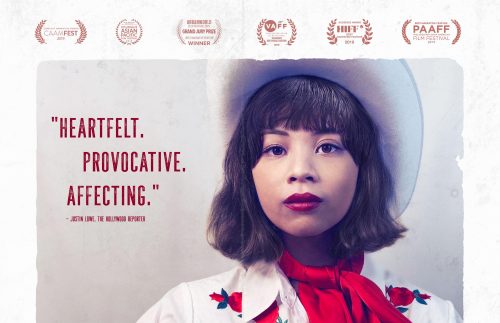By Andrew Hamlin
Northwest Asian Weekly

It’s the first Filipino-led film backed by a major American studio. It features award-winning Filipino stars from Broadway, hit movies, and music.
But it almost didn’t get made.
“I definitely gave up,” confessed the film’s director and co-writer, Diane Paragas. “I gave up somewhere in the middle of this 15-year journey. I said, ‘It’s never going to happen.’”
“Then, I went to the Toronto Film Festival, and I went to a screening with Mira Nair, the great Indian film director, who had just finished making a picture called ‘The Reluctant Fundamentalist.’ Someone in the audience asked her what brought her to her material [for that film] and she said, ‘I’ve been doing all these films with predominantly white casts. And I realized that since I last made a South Asian film, there hasn’t been a South Asian film. So when I stop making movies, [South Asians] stop making movies.’ She realized it was her obligation to make films about people who look like herself, because if she doesn’t do it, no one else is going to do it.”
And that, Paragas said, inspired her to go on with her own project. No matter how long it took or how hard the road, she was going to show the world the completed “Yellow Rose.”
The director commented on the film during a news conference held on Oct. 9, and moderated by Jazz Tangcay of “Variety” magazine. That same day the film opened in American theaters nationwide—in time for America’s Filipino History Month.

“It was difficult, it was a lot of nos,” said Paragas on the struggle for financing. “What finally turned the tables was when I stopped asking permission from white male Hollywood. I went to my own community. The film was financed by a Filipino company, and Filipino private equity investors. That’s who said yes. I did not have to convince them. We found each other.
“And then, Sony Pictures, one of the biggest companies in the world, bought it. It’s incredible. I think that there were no [American] movies with Filipinos, in all the time I was waiting to make this movie. [I said] if I’m not going to do it, nobody’s going to do it. Which is very Filipino!”
The film’s story follows big-screen newcomer Eva Noblezada as the title character, Rose Garcia. Rose aspires to fame as a country singer, performing in and around Austin, Texas. She’s made progress both artistically and commercially, and she’s hoping for a big break to put her in the national spotlight. But suddenly her undocumented mother, Priscillia (Princess Punzalan), gets picked up and detained by ICE officials, and Rose has to hope against hope to free her from the detention center.
Rose gets reluctant help from her aunt, Gail (Tony-winning actress Lea Salonga), who’s assimilated and not inclined to reach out to family. Rose’s country music mentor (Dale Watson, a real country singer playing a fictionalized version of himself), also lends a hand.
Paragas used mostly real locations in the Austin area, although she had to create the ICE detention center from scratch, using an old armory, drawing a look and feel from the director’s earlier projects, where she interviewed actual detainees.

She remembers actual detention centers, people stacked up in piles and given only one thin Mylar sheet each, for bedding. She spoke to people rousted out of their beds at two o’clock in the morning, with no chance to grab belongings.
Despite such harrowing scenes, the director says the cast and crew worked hard with her, to achieve a sense of balance.
“If the movie was just about oppression and detainment, it would be so depressing, and you would probably lose the audience. But because this is the story of a budding artist, trying to find her voice, that makes the heartbreaking scenes more heartbreaking, but gives the audience relief.
“Some people have said the movie takes a lot of twists and turns, but actually that is the life of a migrant. You don’t know where you’re gonna end up. You don’t know where you will call home.”
The film’s done well in festivals, and Paragas confessed she was pleasantly shocked by crowd reactions. Trump supporters came up to her after the film, she commented, saying they now felt Trump should renew DACA. Non-immigrants confessed to her that they’d never thought, or felt, what it might be like to live an immigrant life.
Still, she concludes, the primary revelation of “Yellow Rose” comes from her own people.
“We’re the third largest Asian American population in the country, and we’re virtually invisible in terms of film… I think the most satisfying reactions are when young Filipino women, and they say, ‘I feel seen.’ Every time I hear ‘I feel seen,’ it makes me want to push harder. To show people who look like us. And to have other people see what it’s like to be us. And that only adds to a richer and more powerful society. When we see each other.”
Andrew can be reached at info@nwasianweekly.com.




Very good inspiring story for Filipino immigrant like me.